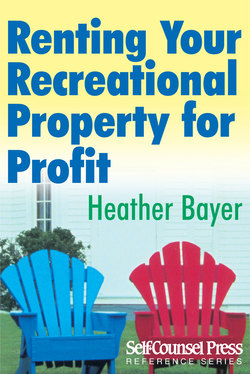Читать книгу Renting Your Recreational Property for Profit - Heather Bayer - Страница 26
На сайте Литреса книга снята с продажи.
How Many Rental Weeks Will You Have Available?
ОглавлениеOnce you have a clear objective about how much income you want to generate, have set a realistic rental rate, and have accurately forecast the expenses, you will know the minimum number of weeks you’ll need to rent to cover your expenses. Readers already involved in the financial aspects of a business will recognize this as identifying your breakeven point — the amount that you have to make in order to cover all your outgoing expenses. Once this has been defined and you have set a contingency amount to cover unexpected expenses, you can then forecast how much profit you will make.
To rent your cottage as a business rather than a hobby requires a commitment from the entire family, so once again, it’s decision-making time!
When do you want to use the cottage for yourself and your family? Will you want several high-season weeks? What about Christmas/New Year’s, public holidays, and school breaks? Unless you and your family are flexible enough to use the property only when it is vacant, you need to decide exactly what dates you have available for paying guests. Once the bookings start to come in, you won’t be able to change your mind without seriously inconveniencing your clients, and possibly facing legal action.
To maximize your income, you’ll need to rent during the entire summer, but that may not be practical if you have family who want to spend some time at your property. At times you may need to be strict with family and friends who may see your cottage as an inexpensive way to vacation, particularly if they have used it in this way in the past. Let everyone know that you are renting in a more professional manner, but that you may have late availability weeks or weekends that they can use. If you have minor jobs that need doing, you could save a little on property management by asking your nonpaying guests to do these tasks. Alternatively, have your nonpaying guests, family, or friends leave a gift for the cottage. Why not keep a list of items that may need replacing from time to time and ask nonpayers to choose from the list and take the replacement item with them to the cottage. Include things such as new pillows, towels, books and games, additions to the fishing tackle box, etc. Guests will appreciate knowing their gift is needed, and you will save on some of these expenses.
Jim Holland’s Clear Lake cottage was a haven to many of his work friends, and he was happy for them to use the property when he wasn’t spending time there himself. Once he started to rent seriously, he decided that he would offer time at the cottage if it hadn’t been booked by the previous week. He left a “job jar” with a list of tasks that needed doing in a prominent position by the beer fridge (figuring this was the first place his guests would go!) with a note attached asking for at least one job to be done in return for the use of the cottage. From the notes of thanks in the guest book, everyone enjoyed the opportunity to give a little back.
Before deciding to rent your cottage in the winter season, give serious thought to what could possibly go wrong. For example, you will need someone to check the property very regularly when it is not occupied to make sure that the residual heating is working and pipes have not frozen. Offering winter rentals means ensuring you can guarantee a continuous supply of water, maintaining the heat throughout the season, and having snow removal organized so your guests can access the property without difficulty. These costs could be significant; however, if you are able to rent during Christmas and New Year’s weeks, along with some rentals during January to March, winter rental could bring valuable income. However, if you are spending all your time troubleshooting winter problems for your guests, or worrying about what may happen, then maybe winter rentals are not such a good idea.
Having decided on the weeks you want to rent, you’ll need to decide on your charging strategy. This is covered in the next chapter, What Is My Recreational Property Worth?
